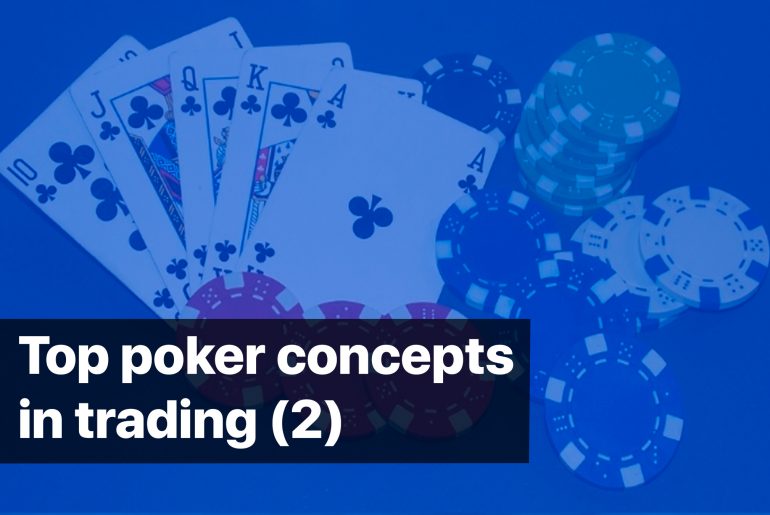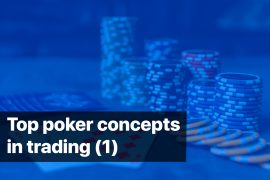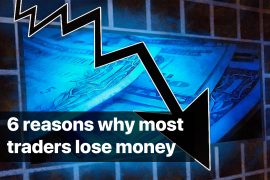In the previous part of the article, we started discussing the common mistakes of traders and poker players. To remind you, both trading and gambling require similar things in terms of psychology. The participants should always stay in control of their emotions and objectively evaluate the process and the results, strictly following the strategy that is planned in advance. In this case, traders and poker players should be masters in managing their own emotions to succeed. Otherwise, the emotions will drive them, leading to failure.
In this part, we continue breaking psychological traps down to help you take your trading to the next level! So…
Hope is not a strategy
“Hot hand phenomenon” is widespread in many areas, including both poker and trading. Seeing positive results, you tend to think that you are more likely to win in the future. However, it does not work this way.
“Past performance is no guarantee of future results.”
In poker, this phenomenon is expressed with the tries of the player to make projections of the future based on the cards seen. Unfortunately, in many cases, the odds aren’t great.
For example, you try to foresee the next market movements based on the previous results. To illustrate, you have J10, and there are Q and K on the flop (you almost succeed). You start feeling like a winner as for you it is obvious that the next card is A.
To tell the truth, the odds of A are about 1/13, however, you are already driven by hope (obviously because you want to see A coming next). Thus, you would like to obtain this card so much that you do not realise that the chances are not so high. It prevails over the logic, distracting you from your plan, you start acting too risky, being sure that you’re right.
Thus, “Hot hand phenomenon” is driven by your positive emotions and hope that you’ll continue gaining. Exactly hope blames your logic and makes you believe in your lucky hand, see the necessary patterns and signals everywhere. By the way, it’s one of the reasons to overhold losing position that often results in a lost deposit.
One more example is investing. So, while choosing an asset, you might pay attention to the advertisements screaming about its astonishing growth during the lastest two years. That’s great! However, does this necessarily mean that an asset’s value will continue increasing? Isn’t it overestimated? Obviously, anything could have happened during these two years, therefore, before blindly investing your money, do your own due diligence on the asset prospects and price dynamics to make an informed decision.
P.S. If you are interested in more investing tips this article is for you!
Remember: Hope is not a strategy! Even if you had a good streak of luck before, even if an asset price is growing currently, it’s necessary to stay in cold blood and be realistic. The best thing you can do is to concentrate on your current performance (not future wins or previous success!) and analyze it precisely.

In this case, it is recommended to be aware of the emotions which can distract you (study trader’s psychology) and thoroughly analyze your performance. The best instrument to keep your emotions away from trading is to monitor your statistics, calculate and audit key trading performance indicators (e.g. profit factor, maximum drawdown, win-loss ratio) that will tell you what exactly happens and what is better to improve to increase your profitability.
Rely on facts and numbers, not emotions and illusions.
Overholding losing positions leads to more losses
“This asset was so promising, now there are just bad times for it”, – keep you saying while being already in the mire of debt.
Why don’t we close a losing position that makes a grim picture for our balance? Interesting question. It can be broken down with the help of a poker case again. So, you get a good combination and start playing with confidence, but then find out that you are not in such a good position as soon as the new cards are opened. Thus, you understand that your opponents are likely to have better combinations. For example, a full house against your trips. In this case, you start hesitating if it is reasonable to stay in-game.
And what happens when you quit the game? Or, in terms of trading, close a losing position? You agree that you made a mistake, which hits your ego. Accepting that you are wrong is difficult for many of us, however, it can save your deposit. The earlier you accept your mistake and cut your losses, the more chances of recovery you get.
On the flip side, the longer you hold the card or the position, the worse your situation becomes. You keep hoping to reach at least breakeven, but constantly lose money.
In this case, it’s recommended to pay more attention not to the sums on your balance, but to the decisions you make. It is difficult to accept that you are wrong, as well as accept losses. However, try to ignore your ego and listen to your logic. So, include the limits on your losing positions into your trading plan and track them in a trading journal. As soon as you see you exceed the limits – cut the losses! This is difficult, but an effective step to reach long-term profitability. Agree that it will bring you more pleasure than making your ego happy while being in debt. By the way, you can even use an automated risk management system to help you control losses.
Being happy not with big money, but with the right decisions is likely to bring you big money. So, concentrate on your strategy first, calculate each step and you’ll find out that you are getting richer day by day. The holy grail is simpler than you may imagine.
So, say “Shaken, not stirred” and multiply your profits!

Stay tuned and join our social media:
Telegram: https://t.me/bitinsurecom
Facebook: https://www.facebook.com/bitinsure
Twitter: https://twitter.com/bitinsure_news





